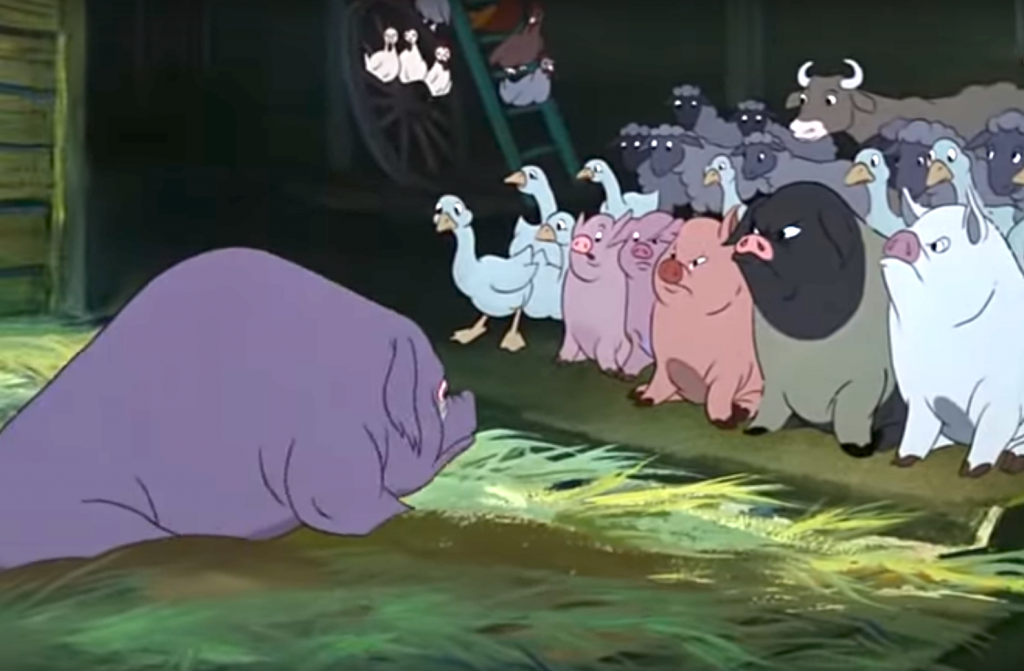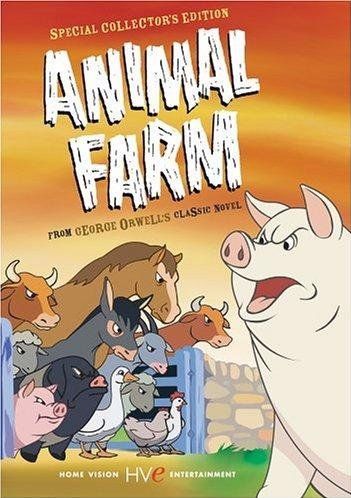Halas and Batchelor’s 1954 Animal Farm holds a firm place in cinematic history as Britain’s second animated feature. The film is based on the 1945 novella by George Orwell and is often read as an allegory for communism and Stalinism. The unrest of the animals and desire for revolution also has echoes of Marxist ideas about the commodification of labour and the devaluation of man. These ideas appear almost immediately in the film in the scene in which Old Major speaks to the other animals gathered around him. He says “Whatever we produce is taken from us, stolen from us and sold”. This is a clear example of the alienation and anger caused by the commodification of labour and Old Major’s speech is what sparks the Animals’ desire to rise up against their cruel dictator Mr. Jones. Though the idea of animals revolting against humans seems absurd the allegorical nature of the story and the use of animation allows the film to subvert reality whilst still being palatable the audience.
In their attempt to restore order after the takeover the animals decide to set rules. Though this seems a positive liberating act, empowering the animals who represent a Marxist style populace, the scene is, in fact, more troubling than that. The visual and audio codes suggest the opposite of any joyous revolutionary reclamation of agency. The scene opens with a long shot of the barn on which Snowball is painting the rules. He is the only animal visible until the camera zooms outwards, revealing the other animals at the bottom of the screen. The barn, looming takes up most of the frame and the dramatic nondiegetic sound has echoes of hunting music due to the prominence of the bugle-like sound. This gives the scene an ominous atmosphere. This also suggests that the threat to the animals has not gone away, they are now simply a threat unto themselves. This refers to the corruption and inequality caused by greed and power which are the biggest threats to fairness when communism is put in practice. Snowball’s isolation in the frame as the first animal shown and his elevated position up a ladder mirrors the elevated position which the pigs think they hold in their new supposedly equal world. Napoleon then reads out the rules in a slow sombre tone as the camera pans downwards revealing the rules one by one. The simple language and declarative tone of the rules hold similarities with the Ten Commandments. The pigs’ self-positioning as the ruling class and this obvious biblical parallel seems to be a criticism of the hierarchical nature of communism, which at times has given corrupt leaders the power to effectively rewrite the rules.
If Animal Farm is an allegory for communism this would suggest that the true enemy of man is man himself. The human characters in the film are all made to look grotesque and the only times they really appear in the film at all is in the pub drinking or in violence against the animals at the farm. The scene in which Mr. Whymper goes to trade with the animals and effectively cross the picket fence is a literal example of this idea of man being the enemy of man. This is because he does not trade with the animals out of kindness, his motivation is simply his own greed, and he does not support his own kind over his own selfish agenda of making money. This in very simple terms shows why communism when put into practise is often problematic and unsuccessful as it is not the concept which is flawed but man himself. Though communism strives for equality it is the greed of individuals and corruptive nature of power which stands in the way of its practical success.
Animal Farm is an explicitly political film which is multi-layered in terms of context and symbolic content, which for an early animated film is very ambitious and successful. The political undertones make the film a thought provoking piece of classic cinema for the adult audience and yet the quality of the animation and simplicity of the basic plotline make it a piece which even younger audiences can enjoy, unaware of the deep political argument underneath.
Bibliography
Marx, Karl, Friedrich Engels, and Authorized English, The communist manifesto (or manifesto of the communist party) (New York: International Publishers Co Inc., U.S., 1992)

